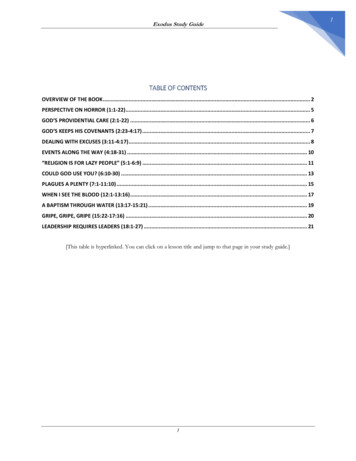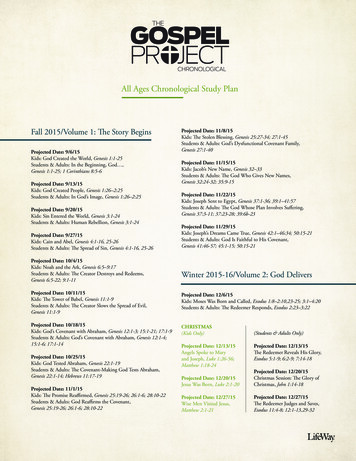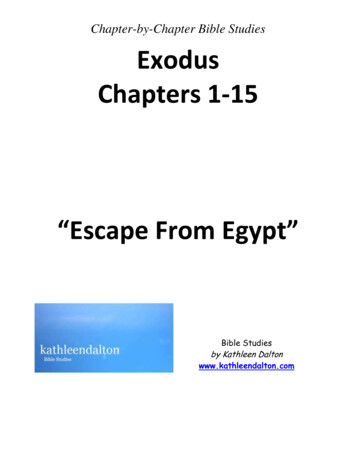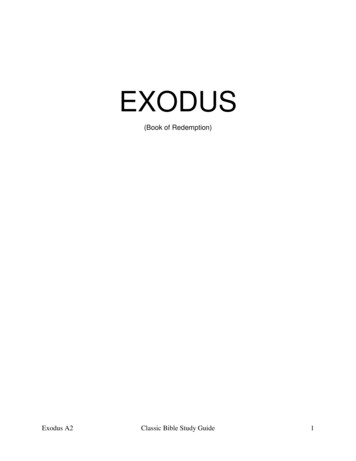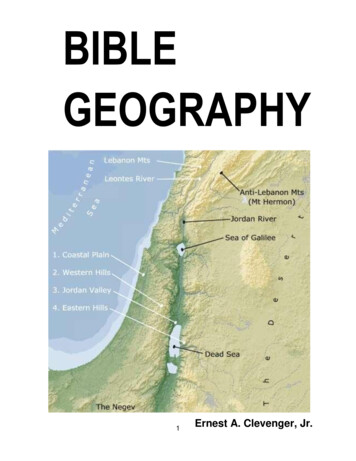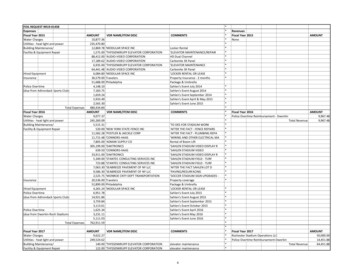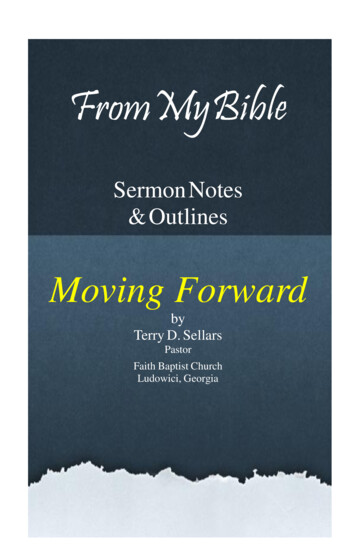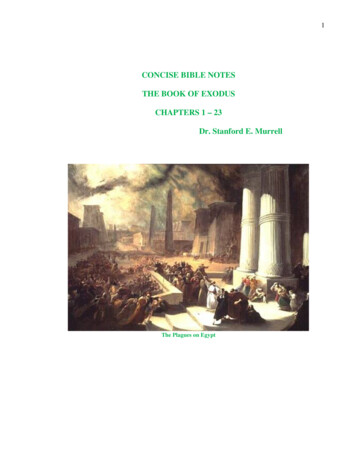
Transcription
1CONCISE BIBLE NOTESTHE BOOK OF EXODUSCHAPTERS 1 – 23Dr. Stanford E. MurrellThe Plagues on Egypt
2Special NoteThis particular study in the book of Exodus focuses attention on the journey of the Hebrewpeople from the Land of Bondage to Canaan. This is not an exhaustive study of Exodus but itdoes draw attention to those events which brought Israel out of Egypt and into Canaan.1 Corinthians 10:11“Now all these things happened unto them for ensamples:and they are written for our admonition,upon whom the ends of the world are come”."The new is in the old contained; the old is by the new explained."Augustine
3EXODUS 1Date of Writing:Themes:Divine Author:Human Author:Setting:Time Period:1400 BCServitude, Salvation, and ServiceGod the Holy SpiritMosesOn the borders of CanaanOne monthFrom Egypt to Canaan1 Now these are the names of the children of Israel, which came into Egypt;every man and his household came with Jacob.1:1. Exodus. The title of the Masoretic text is derived from the Greek translation of the OldTestament called, the Septuagint, because traditionally, it was supposed to have been made byseventy men. In the Hebrew text there is no title only the opening words, “And these are thenames of the sons of Israel”. It is a continuation of Genesis.1:1. The word “now” in verse one is in the Hebrew the word “and”. Nevertheless, “exodus”means literally, “a way out” [Gk. hodos, “a way”; ek, “out”].1:1. children of Israel. When Israel first went down into Egypt, it went as a family unit of aboutseventy or seventy-five souls. After four hundred years in the land of bondage, the people hadgrown to form a nation. The story of Israel’s redemption from bondage in Egypt is spiritually thestory of the believer’s deliverance by Jesus Christ from bondage to sin. In 1 Corinthians 10:6 theapostle Paul speaks of the example the church finds in the experiences of the nation Israel. “Nowthese things were our examples, to the intent we should not lust after evil things, as they alsolusted. What happened to Israel was destined to be an example to the church. 1 Corinthians10:11 Now all these things happened unto them for ensamples: and they are written for ouradmonition, upon whom the ends of the world are come. The apostle Paul says that what waswritten was for “our learning”, the learning of the church. Romans 15:4 For whatsoever thingswere written aforetime were written for our learning, that we through patience and comfort ofthe scriptures might have hope.2 Reuben, Simeon, Levi, and Judah,3 Issachar, Zebulun, and Benjamin,4 Dan, and Naphtali, Gad, and Asher.5 And all the souls that came out of the loins of Jacob were seventy souls: forJoseph was in Egypt already.
46 And Joseph died, and all his brethren, and all that generation.7 ¶ And the children of Israel were fruitful, and increased abundantly, andmultiplied, and waxed exceeding mighty; and the land was filled with them.1:7. fruitful. This word is found in Genesis 1:21 and in Genesis 12. God fulfilled His promise tothe patriarchs. There might have been as many as two million to come out of Egypt based onpopulation studies (see Malthus).8 Now there arose up a new king over Egypt, which knew not Joseph.1:8. Egypt. Egypt is a tableland of sand. However, because the Nile river flows for five hundredmiles down into the Mediterranean, and because it overflows every year with the water thatcomes down from the highlands in Central Africa. Each year the river overflows and floods forabout seven miles on each side of the Nile so that it becomes some of the most fertile land in allof the world. Egypt becomes a symbol of worldliness and prosperity with little need forexcessive labor. But when people prosper, they tend to forget the Lord.9 And he said unto his people, Behold, the people of the children of Israel aremore and mightier than we:10 Come on, let us deal wisely with them; lest they multiply, and it come to pass,that, when there falleth out any war, they join also unto our enemies, and fightagainst us, and so get them up out of the land.11 Therefore they did set over them taskmasters to afflict them with theirburdens. And they built for Pharaoh treasure cities, Pithom and Raamses.12 But the more they afflicted them, the more they multiplied and grew. And theywere grieved because of the children of Israel.1:12. afflicted them. Nations forget the good that others have done for them.13 And the Egyptians made the children of Israel to serve with rigour:1:13. rigour. Labor camps gave way to secret genocide which in turn became open genocide andat the height of persecution, a pogrom. So the Israelites learned the blessing of suffering. TheLord is not enjoyed until we turn from animalistic activity. “God whispers to us in pleasures,He speaks in our conscience, He shouts in our pains” (C. S. Lewis). If the Lord cannot speak tous in labor or in our conscience, He will get our attention through suffering.
514 And they made their lives bitter with hard bondage, in morter, and in brick,and in all manner of service in the field: all their service, wherein they made themserve, was with rigour.15 ¶ And the king of Egypt spake to the Hebrew midwives, of which the name ofthe one was Shiphrah, and the name of the other Puah:1:15. midwives. Those who fear God will not kill babies, they will not perform abortions, earlyor late term.16 And he said, When ye do the office of a midwife to the Hebrew women, andsee them upon the stools; if it be a son, then ye shall kill him: but if it be adaughter, then she shall live.17 But the midwives feared God, and did not as the king of Egypt commandedthem, but saved the men children alive.18 And the king of Egypt called for the midwives, and said unto them, Why haveye done this thing, and have saved the men children alive?19 And the midwives said unto Pharaoh, Because the Hebrew women are not asthe Egyptian women; for they are lively, and are delivered ere the midwives comein unto them.1:19. Pharaoh. By way of typology, Pharaoh is Satan, and Satan is stupid when it comes tospiritual matters. The midwives obviously made up a story but Pharaoh accepted it.20 Therefore God dealt well with the midwives: and the people multiplied, andwaxed very mighty.21 And it came to pass, because the midwives feared God, that he made themhouses.1:21. houses. The Lord honored the midwives with families of their own. Question: “How couldGod have blessed the midwives when they lied?” In the fifth century, Augustine thought aboutthis and wrote a work called, De Mendaci or “Concerning Lying”. Today this question isdiscussed under situation ethics. Augustine decided it is always wrong to lie but God blessed thewomen because their lying was an expression of their fear of God. Faith is not always a perfectfaith. Rahab did the same thing. She lied. And yet she is listed in Faith’s Hall of Faith. Godblessed her not because she lied but because she was moved by faith. God sovereignly uses sinincluding the sin of Deicide (Acts 2 ).
622 And Pharaoh charged all his people, saying, Every son that is born ye shallcast into the river, and every daughter ye shall save alive.
7EXODUS 2The Rise of a ProphetExodus 2:1-91 And there went a man of the house of Levi, and took to wife a daughter of Levi.2:1. In Exodus 2 there is the story of God’s providential control of history (2:1-22), the sovereignmercy in covenant (2:24), and the concern of God for His suffering people (2:11, 23).2:1. In the New Testament, the events of Exodus 2 are referenced twice: Acts 7:17ff andHebrews 11:23ff.2:1. Levi. Moses was from the tribe of Levi, the priestly line.2 And the woman conceived, and bare a son: and when she saw him that he was agoodly child, she hid him three months.2:2. goodly child. The beauty of Moses was outward and inward. Acts 7:20 says Moses was “fairto God”. And Hebrews 11:23 says he was a “proper child”, that is “a godly child, a fair to Godchild”.3 And when she could not longer hide him, she took for him an ark of bulrushes,and daubed it with slime and with pitch, and put the child therein; and she laid it inthe flags by the river's brink.2:3. slime and pitch. The little ark, like that of Noah, was waterproof. Moses was placed in thewater so that his parents could say they had honored the letter of the law of the land. Pharaoh hadcommanded that every son born was to be cast into the water (Exodus 1:22), so Moses was castinto the water.4 And his sister stood afar off, to wit [know] what would be done to him.5 ¶ And the daughter of Pharaoh came down to wash herself at the river; and hermaidens walked along by the river's side; and when she saw the ark among theflags, she sent her maid to fetch it.6 And when she had opened it, she saw the child: and, behold, the babe wept.And she had compassion on him, and said, This is one of the Hebrews' children.2:6 Hebrew’s children. Here is an example of Job 5:13 being fulfilled.
87 Then said his sister to Pharaoh's daughter, Shall I go and call to thee a nurse ofthe Hebrew women, that she may nurse the child for thee?8 And Pharaoh's daughter said to her, Go. And the maid went and called thechild's mother.9 And Pharaoh's daughter said unto her, Take this child away, and nurse it for me,and I will give thee thy wages. And the woman took the child, and nursed it.The Adoption of MosesExodus 2:1010 And the child grew, and she brought him unto Pharaoh's daughter, and hebecame her son. And she called his name Moses: and she said, Because I drew himout of the water.2:10. Moses. The word “Moses” is related to the Hebrew word that means, “to draw.” Moseswas the third child of Amram and Jochebed. His father married his aunt. They had Miriam,Aaron, and then Moses. For forty years Moses was in the royal palace and so was learned ortrained in all the wisdom of Egypt (Acts 7:22).The Sincere but Misguided Actions of MosesExodus 2:11-1611 ¶ And it came to pass in those days, when Moses was grown, that he went outunto his brethren, and looked on their burdens: and he spied an Egyptian smitingan Hebrew, one of his brethren.12 And he looked this way and that way, and when he saw that there was no man,he slew the Egyptian, and hid him in the sand.2:12. Looked. Moses looked with compassion on the injustice of his brethren and killed theEgyptian.13 And when he went out the second day, behold, two men of the Hebrews strovetogether: and he said to him that did the wrong, Wherefore smitest thou thy fellow?14 And he said, Who made thee a prince and a judge over us? Intendest thou tokill me, as thou killedst the Egyptian? And Moses feared, and said, Surely thisthing is known.
915 Now when Pharaoh heard this thing, he sought to slay Moses. But Moses fledfrom the face of Pharaoh, and dwelt in the land of Midian: and he sat down by awell.2:13-15. Moses fled. Stephen points out that Moses perceived at this point that the Hebrewpeople rejected him as Israel would one day reject the Messiah. To Stephen, Moses was a type ofthe rejected Christ.2:15. Midian. The location of this area is unknown. What is known is that Moses went to the eastand then went down south and east in the peninsula of Sinai. Had he taken a different route hemight have been captured and sent back to Egypt for Ramses II had a treaty with the Hittitesregarding fugitives.16 Now the priest of Midian had seven daughters: and they came and drew water,and filled the troughs to water their father's flock.2:16. priest of Midian. The Midianites were monotheists and so, in the area of religion, Moseswould have felt at ease.The Tyranny of Men over Women BrokenExodus 2:17-2217 And the shepherds came and drove them away: but Moses stood up and helpedthem, and watered their flock.18 And when they came to Reuel their father, he said, How is it that ye are comeso soon to day?19 And they said, An Egyptian delivered us out of the hand of the shepherds, andalso drew water enough for us, and watered the flock.20 And he said unto his daughters, And where is he? Why is it that ye have leftthe man? Call him, that he may eat bread.21 And Moses was content to dwell with the man: and he gave Moses Zipporahhis daughter.22 And she bare him a son, and he called his name Gershom: for he said, I havebeen a stranger in a strange land.
10A Nation Sighed and A Covenant was RememberedExodus 2:23-2523 ¶And it came to pass in process of time, that the king of Egypt died: and thechildren of Israel sighed by reason of the bondage, and they cried, and their crycame up unto God by reason of the bondage.2:23. sighed. It is good when a soul sighs and cries unto the Lord Jesus Christ for salvation.24 And God heard their groaning, and God remembered his covenant withAbraham, with Isaac, and with Jacob.2:24. His covenant. The goal of all history is covenantal blessing.25 And God looked upon the children of Israel, and God had respect unto them.2:25. God looked. Heb. God knew. The God who is there is the God who is not silent. But Hedoes act according to His own plans. There is a great illustration of this concept in Mark 6. TheLord comes to those who are afraid, toiling, and in danger. The Lord will comes to those whosigh for Him.
11EXODUS 3The Vision of GodExodus 3:1-61 Now Moses kept the flock of Jethro his father in law, the priest of Midian: andhe led the flock to the backside of the desert, and came to the mountain of God,even to Horeb.3:1. kept. Literally, “Now Moses was keeping the flock.” It had been happening for a long time.3:2. the mountain of God (Heb. har haa-‘Elohiym). The traditional site at which this Divineencounter took place was “Gabel Musa” or “The Mountain of Moses” or “Moses” Mountain” butin the Hebrew is called, “the mountain of God”. This place was part of a range of mountainsrising to about 7500 square feet in altitude.3:1. Horeb. Horeb and Sinai are the same place.2 And the angel of the LORD appeared unto him in a flame of fire out of themidst of a bush: and he looked, and, behold, the bush burned with fire, and thebush was not consumed.3:2. the Angel of the LORD. This is a reference to the second person of the Trinity in his preincarnate ministry. Jesus Christ is the eternal Son of God and thus He is very God of very God.There are several appearances of the Angel of the Lord in the Old Testament including the one inGenesis 16:7-13. Certainly Moses considered the Angel of the Lord as a Divine Being (Exodus3:2 with Exodus 3:4). Moses call Him, God.3:2. burned with fire. In Scripture, fire is symbolic of judgment. It is also associated withpurification and so of holiness (Genesis 3:24). In the New Testament, when the Holy Spirit wasgiven in fulness on the Day of Pentecost, there was a purifying facet in the form of cloven ordivided “tongue of fire” that sat upon each person (Acts 2:1-4).3 And Moses said, I will now turn aside, and see this great sight, why the bush isnot burnt.The Revelation of GodExodus 3:4-64 And when the LORD saw that he turned aside to see, God called unto him out ofthe midst of the bush, and said, Moses, Moses. And he said, Here am I.
12Moses before the Burning BushDomenico Fetti, c. 16145 And he said, Draw not nigh hither: put off thy shoes from off thy feet, forthe place whereon thou standest is holy ground.3:5. put off thy shoes. Literally, “slip off your sandals”. Normally, in the ancient world it was theservant who put off their shoes. But now Moses will become a servant (Number 12:7).3:5. holy ground. Where God is, there is holy ground. Moses recorded God as calling it “holyground” and Stephen repeats the expression (Acts 7:33).6 Moreover he said, I am the God of thy father, the God of Abraham, the Godof Isaac, and the God of Jacob. And Moses hid his face; for he was afraid to lookupon God.3:1-6. I am. The importance of this event is magnified in the New Testament when the Lord usesit to confirm the Doctrine of the Revelation in Matthew 22:23-32. And then in the book of Acts,Stephen cites Exodus 3:1-6 in his sermon (Acts 7:30-35).3:6. Moses hid his face. Moses did this because he was afraid to look upon God. Moses knewthat no man can look upon God and live (Exodus 33:20). Not only can no man look upon God inHis essential being and live but no man can see God in His essential being (1 Timothy 6:16).However, in the person of the Lord Jesus Christ, we have seen the Father (John 14:8-9).
13God’s KnowledgeBecomes God’s PurposeExodus 3:7-87 ¶ And the LORD said, I have surely seen the affliction of my people whichare in Egypt, and have heard their cry by reason of their taskmasters; for Iknow their sorrows;8 And I am come down to deliver them out of the hand of the Egyptians, andto bring them up out of that land unto a good land and a large, unto a landflowing with milk and honey; unto the place of the Canaanites, and theHittites, and the Amorites, and the Perizzites, and the Hivites, and theJebusites.3:8. I am come down. God will deliver His people but He will use a mediator (3:10). ThePsalmist remembered how God used Moses. Psalms 103:7 He made known his ways unto Moses,his acts unto the children of Israel. Moses knew the “ways” of God while the children of Israelonly understood or saw the “acts” of God.3:8. filled. Hebrew, zuwb (zoob), “to flow freely (as water)”; “to overflow”.9 Now therefore, behold, the cry of the children of Israel is come unto me:and I have also seen the oppression wherewith the Egyptians oppress them.The Commission of MosesExodus 3:1010 Come now therefore, and I will send thee unto Pharaoh, that thou mayestbring forth my people the children of Israel out of Egypt.3:10. I will send thee. “One can look on into the history of the Christian era and see this greatprinciple still working and in days of the Arian controversy, it was God working throughAthanasius primarily and his defense of the ‘omoousian [homoousian] or “of the principle andthe doctrine that Jesus Christ was of like-nature with God,” was of the same nature, I should say,“of God,” rather than “of like-nature with God.” The ‘omoousian [homoousian] instead of the‘omoiousian [homoiousion], just a little, a letter difference, one letter difference in those twoparticular words, but all the difference in the world between doctrines. ‘omoousion[homoousian]- of the same nature as the Father, omoiousian [homoiousion] - The Lord Jesushaving a like-nature to the Father. That is the difference between being simply a creature andbeing the Creator, and Athanasius stood, he suffered a great deal as a result of it for that truth,and as a result, we are indebted to him in the Christian churches, indebted to him for fact that itsteachers and preachers down through the centuries have firmly held to the doctrine of the deity ofJesus Christ.
14God worked through the mediation of Augustine in undertaking to make plain, doctrine of divinegrace” (S. Lewis Johnson). The Principle of Mediation continued through Augustine, MartinLuther, John Calvin, John Knox, Hudson Taylor, and George Mueller.3:10. Thou mayest bring forth. Literally, “Bring forth my people.” In the forty years in the desertMoses had become a prepared leader. He was prepared by being married. He was prepared bybeing a parent. He was prepared by being a shepherd, which is a ruler. He was prepared by hisdeep mediations in the desert. God’s servants have a deep personal relationship with Him. Moseswas also prepared by the hunger of an exile’s heart. He wanted to be with the people of God.Every Christian has the heart of an exile. We want to be with the Lord. (John 17:24; Philippians1:23).The Reluctant LeaderExodus 3:11-1211 ¶ And Moses said unto God, Who am I, that I should go unto Pharaoh, and thatI should bring forth the children of Israel out of Egypt?3:11. Who am I. Moses was a humble man, a modest man. Gideon had the same response as didJeremiah. When we say, “I cannot” let it be followed by “But God can!”12 And he said, Certainly I will be with thee; and this shall be a token [sign]unto thee, that I have sent thee: When thou hast brought forth the people outof Egypt, ye shall serve God upon this mountain.3:12. this. (Heb. zeh). The sign that God was going to honor the work of Moses was the burningbush (Exodus 5:1). But what is the meaning of the sign? Perhaps it is a representative of thenation Israel which is like a bush, small and insignificant. Israel is burning. God is burning allover Israel. God will judge Israel and then purify Israel. They must pass through the judgmentbut covenant mercy will be shown to them in time and they will survive.The prophet Isaiah said, Isaiah 33:14 The sinners in Zion are afraid; fearfulness hath surprisedthe hypocrites. Who among us shall dwell with the devouring fire? Who among us shall dwellwith everlasting burnings? The answer to Isaiah’s question is, the elect. The elect of Israel andthe elect of the church shall pass through the fire and shall be purified because Christ passedthrough the Cross and is made perfect.3:13. I will be with thee. Here is one of the great promises of the Bible. This promise was givento others.
15Doctrine of the Promise“I will be with thee.”1. God promised to be with Abraham. Genesis 26:3 Sojourn in this land, and I will be with thee,and will bless thee; for unto thee, and unto thy seed, I will give all these countries, and I willperform the oath which I sware unto Abraham thy father;2. God promised to be with Jacob. Genesis 31:3 And the Lord said unto Jacob, Return unto theland of thy fathers, and to thy kindred; and I will be with thee.3. God promised to be with Moses. Exodus 3:12 And he said, Certainly I will be with thee; andthis shall be a token unto thee, that I have sent thee: When thou hast brought forth the peopleout of Egypt, ye shall serve God upon this mountain.4. God promised to be with Joshua on three occasions.Before entering the Land of Promise. Deuteronomy 31:23 And he gave Joshua the son of Nuna charge, and said, Be strong and of a good courage: for thou shalt bring the children ofIsrael into the land which I sware unto them: and I will be with thee.After entering the Land of Promise. Joshua 1:5 There shall not any man be able to standbefore thee all the days of thy life: as I was with Moses, so I will be with thee: I will not failthee, nor forsake thee.Prior to the day of battle. Joshua 3:7 And the Lord said unto Joshua, This day will I begin tomagnify thee in the sight of all Israel, that they may know that, as I was with Moses, so I willbe with thee.5. God promised to be with Gideon. Judges 6:16 And the Lord said unto him, Surely I will bewith thee, and thou shalt smite the Midianites as one man.6. God promised to be with Solomon. 1 Kings 11:38 And it shall be, if thou wilt hearken untoall that I command thee, and wilt walk in my ways, and do that is right in my sight, to keepmy statutes and my commandments, as David my servant did; that I will be with thee, andbuild thee a sure house, as I built for David, and will give Israel unto thee.7. God promised to be with Israel. Isaiah 43:2 When thou passest through the waters, I will bewith thee; and through the rivers, they shall not overflow thee: when thou walkest throughthe fire, thou shalt not be burned; neither shall the flame kindle upon thee.8. The Lord Jesus has promised to never leave nor forsake His own. Hebrews 13:5 Let yourconversation be without covetousness; and be content with such things as ye have: for hehath said, I will never leave thee, nor forsake thee.
16The Name Above all NamesExodus 3:13-2213 And Moses said unto God, Behold, when I come unto the children of Israel,and shall say unto them, The God of your fathers hath sent me unto you; and theyshall say to me, What is his name? What shall I say unto them?3:13. What shall I say unto them? Moses is suggesting that the people have forgotten their Godduring their Egyptian bondage. It is possible to lose one’s first love. It is also possible that thename of God changed. For example, in Genesis 16:13 Hagar gave God a new name, a newdescription, “Thou God seest me”.14 And God said unto Moses, I AM THAT I AM: and he said, Thus shalt thousay unto the children of Israel, I AM hath sent me unto you.3:14. I AM. There is only one self-existing Being in the universe and that is God. Here is a greatmystery but is the ground of God’s essence including His immutability. This affirmation is thefundamental nature and Being of God. This is not a truth to be debated but to be affirmed byfaith and without help. A. W. Tozer has said, “A God who must be defended is one who can helpus only while someone is helping him.”3:14. I AM.By His answer God was saying to Moses, “I AM who I AM” in order to reveal a designation ofHis divine personality. Contrast this to the statue of the Egyptian god, Isis where it was written,“I am the thing that is, and was, and shall be”. But God is not a “thing”, He is a person.By His answer God Moses His divine eternality. He is independent of time. He has no beginningand no end.There is also a divine ineffability in God’s answer. This means there is no one like God. “Moses,you ask for a name? I AM who I AM”. To whom then will you liken God? Or with what likenesswill you compare Him?” (Isaiah 40:18). The answer of course is that a comparison cannot bemade. God is the God of divine activity, and that too is conveyed in this answer. God was activein creation. He is active in redemption. He is active in providence.By His answer God shows that He is a relational God. God made a covenant with Abraham,Isaac, and Jacob (Genesis 12:3) and He will keep it for His name is forever.By His answer God reveals He is imminent and can be seen in creation (Romans 1:20), but He isalso the transcendent God."Thou hast become to me court of deity".William Wordsworth
17Admiring a Primrose Growing out of a Rock"When you look at the sun and you see a yellow disk in the sky,I hear someone crying out holy, holy, holy.”William Blake3:14. I AM. The fullest bodily expression of the great “I AM” is seen in the Jesus Christ. Severaltimes the Lord Jesus took this name for Himself in John 4:26, 6:20, and in 8:58.15 And God said moreover unto Moses, Thus shalt thou say unto the childrenof Israel, The LORD God of your fathers, the God of Abraham, the God ofIsaac, and the God of Jacob, hath sent me unto you: this is my name for ever,and this is my memorial unto all generations.3:15. LORD. YHWH. No vowels were used in writing for the Hebrew language was a languageof consonants. The Hebrews did not pronounce the name of God lest they be guilty of taking theLORD”S name in vain. So the covenant name, the Tetragrammaton, the four letters word forGod was changed to Lord or Adonai. “I AM”, “HE IS”, or “HE CAUSES TO BE”, are all rootedin the verb “I AM”. Yahweh is acceptable for the covenant name of God and so is Jehovahwhich is translated LORD in the Authorized Version. The lower case letters translated “Lord”refers to Elohim or Adonai, the substituted names for YHWH. The word can also mean simplymaster, like lord, sir.3:15. the God of Abraham. This expression is used thirteen times in Scripture in relation to Hiscovenant. God does not have a name but He does have a designation. God is impossible to defineabsolutely but relatively He is the covenant keeping God of Abraham, the God of Isaac, and theGod of Jacob.16 Go, and gather the elders of Israel together, and say unto them, TheLORD God of your fathers, the God of Abraham, of Isaac, and of Jacob,appeared unto me, saying, I have surely visited you, and seen that which isdone to you in Egypt:3:16. gather the elders. Moses was to leave Midian and return to the Hebrew people where theIsraelites were led by a body of men.3:16. I have surely visited you. This expression means, “I have shown concern for you”.17 And I have said, I will bring you up out of the affliction of Egypt unto theland of the Canaanites, and the Hittites, and the Amorites, and the Perizzites,and the Hivites, and the Jebusites, unto a land flowing with milk and honey.
1818 And they shall hearken to thy voice: and thou shalt come, thou and theelders of Israel, unto the king of Egypt, and ye shall say unto him, The LORDGod of the Hebrews hath met with us: and now let us go, we beseech thee,three days' journey into the wilderness, that we may sacrifice to the LORDour God.19 ¶ And I am sure that the king of Egypt will not let you go, no, not by[except by] a mighty hand.3:19. I am sure. There is in God not only divine foreknowledge but divine sovereignty ofcertainty.20 And I will stretch out my hand, and smite Egypt with all my wonders[miracles] which I will do in the midst thereof: and after that he will let yougo.3:20. Wonders. The wonders of God are the miracles of God. George McDonald said, "Themiracles of Jesus were the ordinary works of his Father, wrought, small and swift that we mighttake them in."21 And I will give this people favour in the sight of the Egyptians: and it shallcome to pass, that, when ye go, ye shall not go empty:3:21. I will give this people favour. If it was not wrong for the LORD to cause the Egyptians tofavor the Hebrew people, neither is it wrong for Him to favor one people above another. He doesno wrong.22 But every woman shall borrow of her neighbour, and of her thatsojourneth in her house, jewels of silver, and jewels of gold, and raiment: andye shall put them upon your sons, and upon your daughters; and ye shall spoilthe Egyptians.
19EXODUS 4The First SignThe Sign of the RodExodus 4:1-51 And Moses answered and said, But, behold, they will not believe me, norhearken unto my voice: for they will say, The LORD hath not appeared unto thee.4:1. And Moses answered. Moses was a man who was reluctant to obey the Lord. He gave anexcuse from false humility in Exodus 3:11 asking, “Who am I?” And in Exodus 4:10 hementions that he is not an eloquent man for he is “slow of tongue”. The answer of course is thatMoses is no-one in and of himself. But then, his commission and his mission is not about himselfbut about God. God will be w
CONCISE BIBLE NOTES THE BOOK OF EXODUS CHAPTERS 1 – 23 Dr. Stanford E. Murrell The Plagues on Egypt. 2 Special Note This particular study in the book of Exodus focuses attention on the journey of the Hebrew people from the Land of Bondage to

